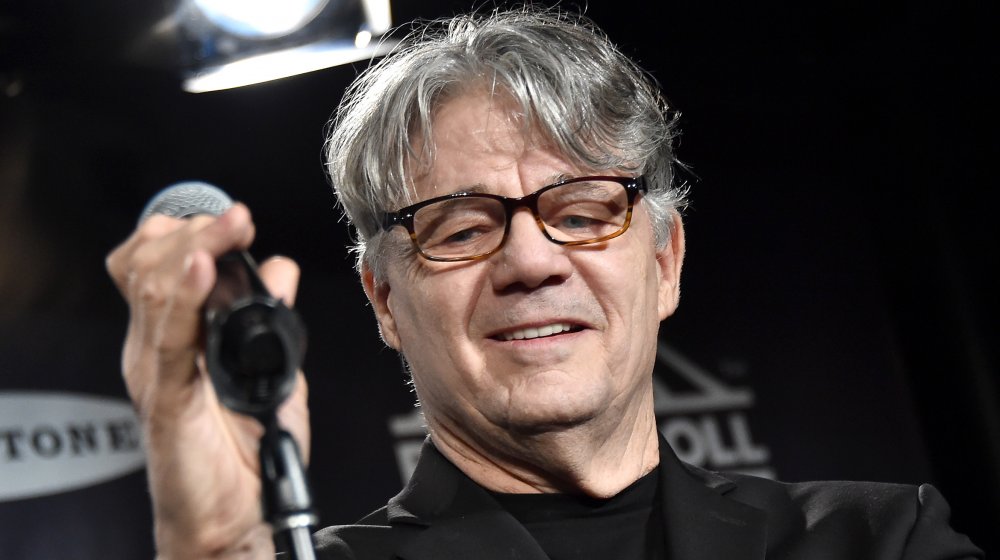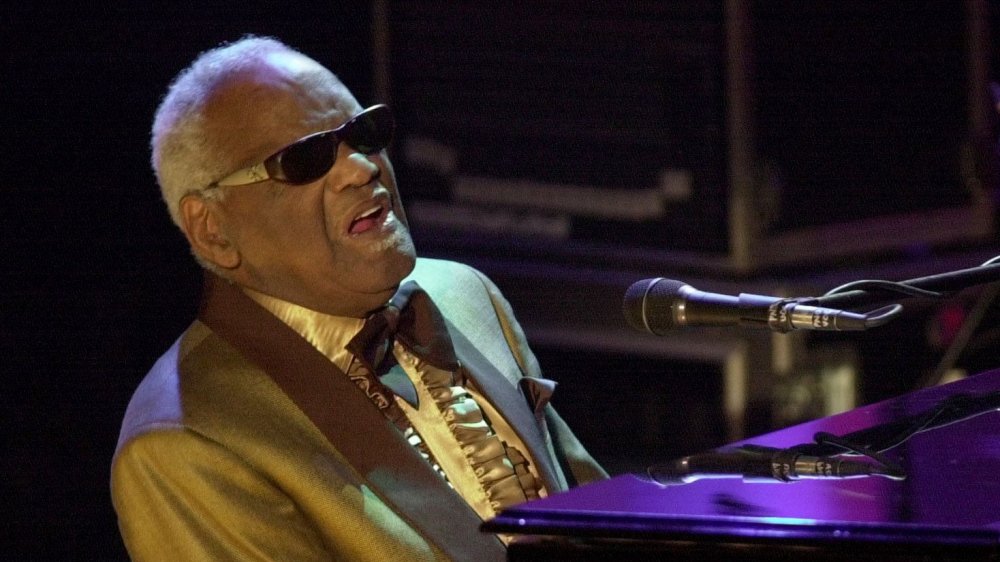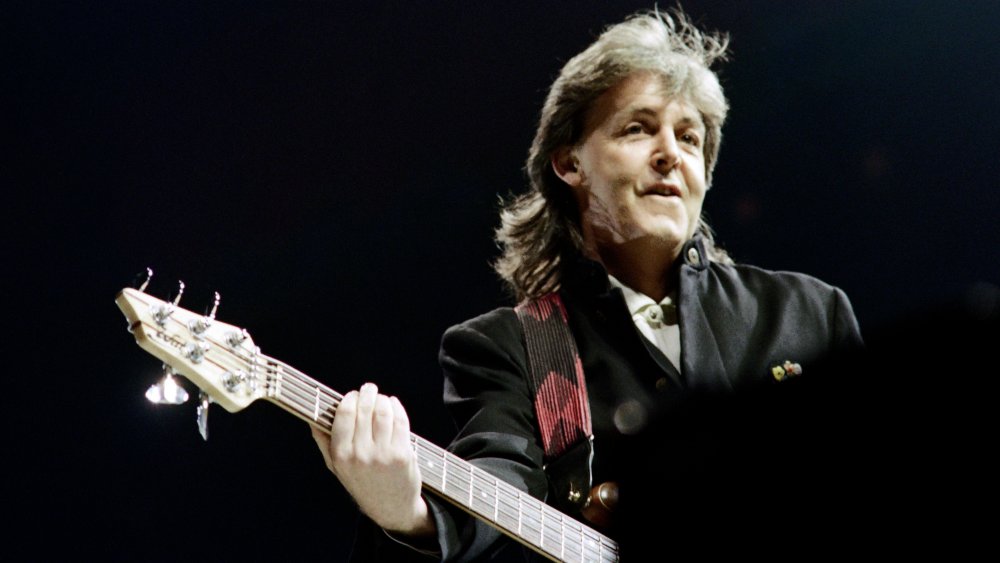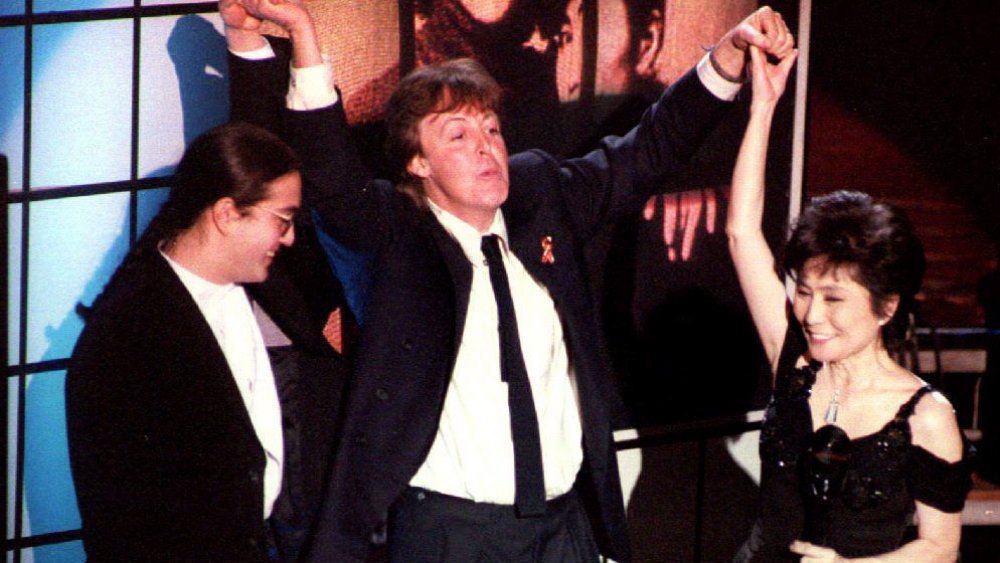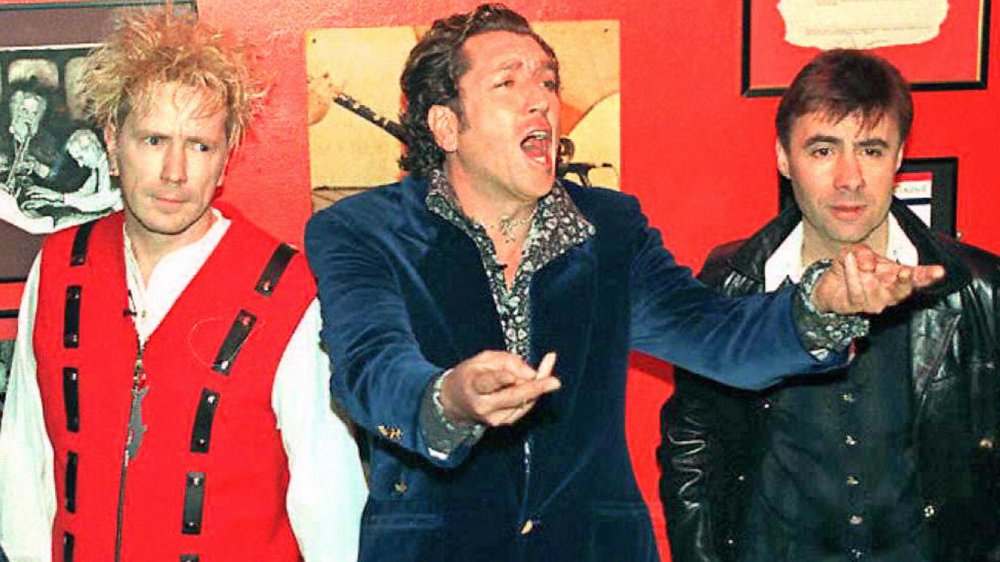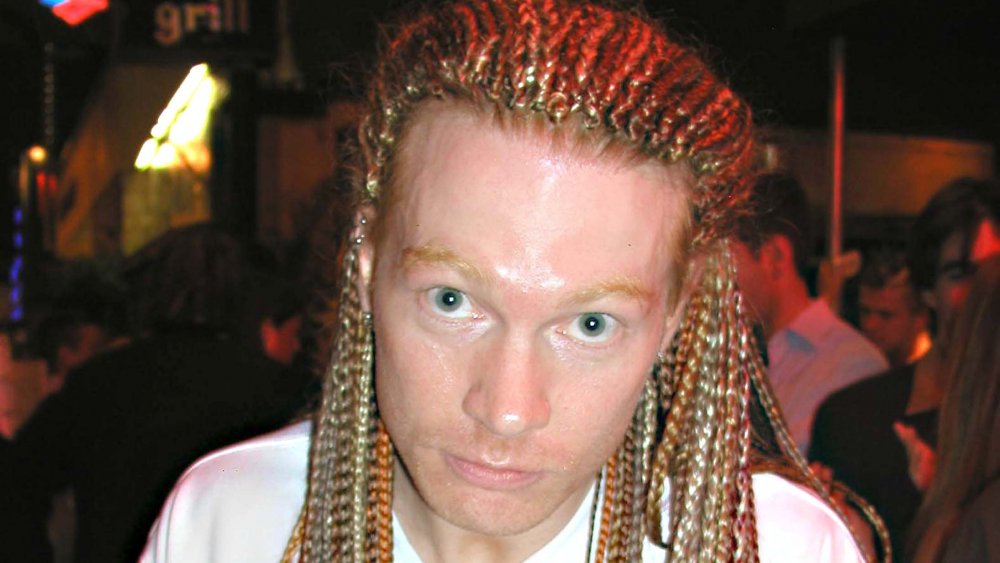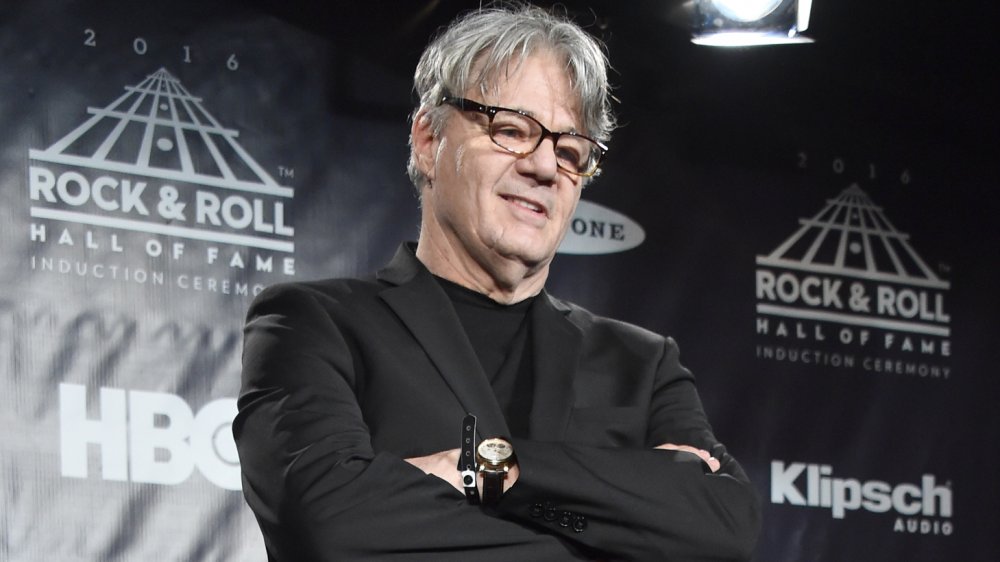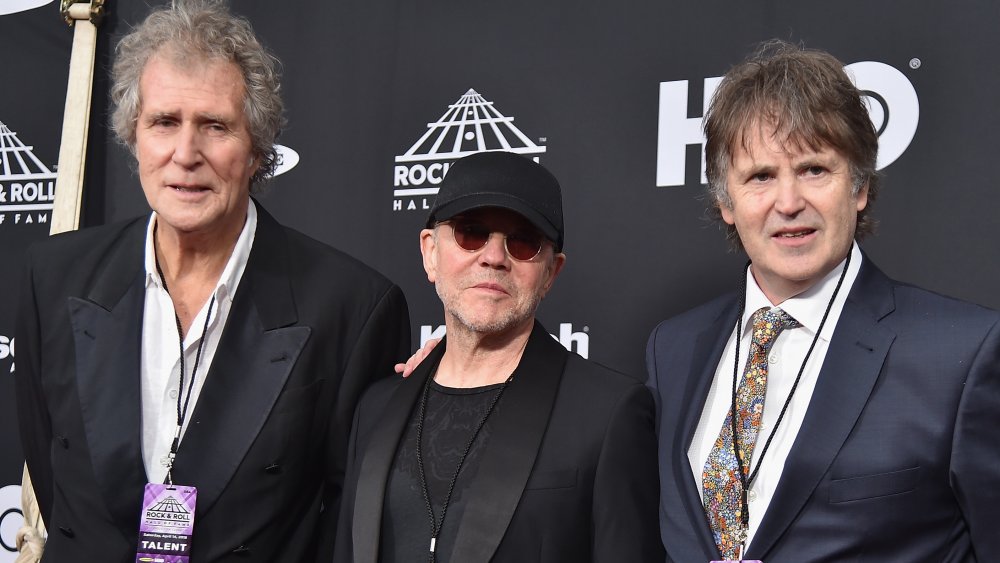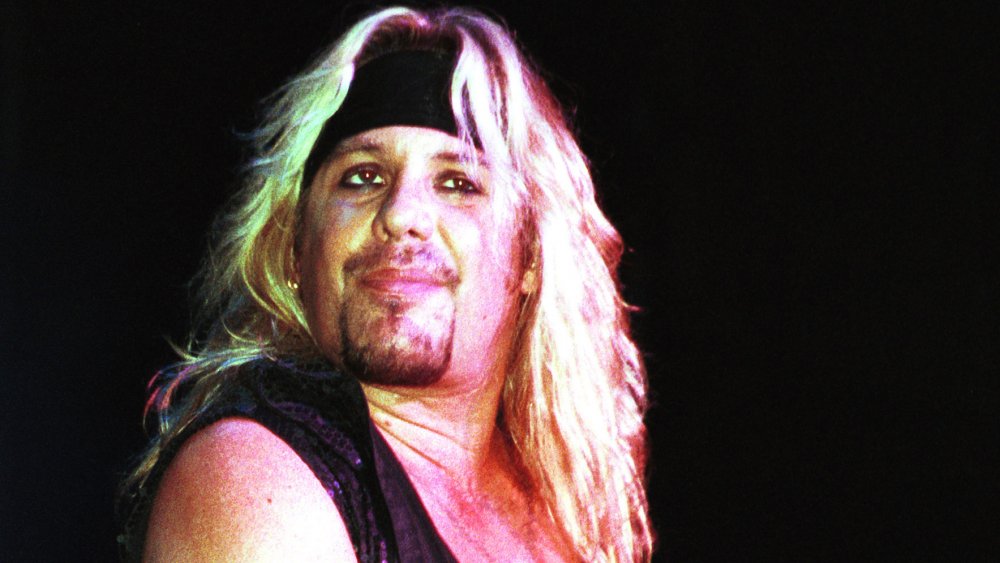The Controversial History Of The Rock And Roll Hall Of Fame
By the early 1980s, it was obvious that rock music and its various permutations were here to stay, and it seemed time that this world had a place to enshrine its greats — the most successful, innovative, and important bands, singers, sidemen, and producers to ever put a few notes together. Thus, the Rock and Roll Hall of Fame was created, and since 1986, it's annually honored luminaries like the Beatles, Bob Dylan, James Brown, Prince, Tom Petty, the Ramones, Green Day, Aretha Franklin, Stevie Wonder, Stevie Nicks, and hundreds more.
The Hall's yearly ceremony is one of rock's biggest nights. New inductees generally get to hear an induction speech from a famous acolyte before giving an acceptance speech, playing a few of their hits, and then participating in a jam session featuring as many musical legends that can fit on a stage. It's an American institution almost as complex and historic as rock 'n' roll itself, which is to say it's rife with scandal, fights, and embarrassing stories. When you've got that many power players and egos all in one room, things are bound to get intense and, occasionally, downright nasty. From its treacherous origins to the various no-shows, here's the controversial history of the Rock and Roll Hall of Fame.
The Rock and Roll Hall of Fame was supposed to be just a TV special
According to Joe Hagan's Sticky Fingers, TV producer Bruce Brandwen came up with a show idea in 1982 called The Kings and Queens of Rock and Roll. Through his production company Black Tie Network, he would put various rock greats from the '50s and '60s up on stage, tape their performances, give them awards, and package it all into a pay-per-view TV event. An ad man he knew suggested a better name — The Rock and Roll Hall of Fame — and Brandwen ran with that. His team set up induction rules, planned a modest museum to show off music memorabilia, and formed a board of directors.
Brandwen set up the Hall as a nonprofit organization, and then had it sign a five-year contract with Black Tie to produce the annual induction ceremony. However, the founder had just one big problem. He needed to get the music industry on board. So he hired Bob Dylan's lawyer, David Braun, who recruited Atlantic Records executive Ahmet Ertegun to head up the Hall. Ertegun then stacked the board of directors with lawyers, agents, and brass from other record companies. The Hall's executive director, Suzan Evans, then reached out to Rolling Stone publisher (and rock n' roll tastemaker) Jann Wenner to be on the nominating committee. He turned that down, as he wanted to be on the board of directors instead. Everything was in place for Brandwen to lose control of his own organization.
Why it's in Cleveland
After Ahmet Ertegun, Jann Wenner, and various other musical bigwigs joined the Rock and Roll Hall of Fame's board, development on the project slowed way down, according to Joe Hagan's Sticky Fingers. The record executives were less interested in the televised induction and concert, and instead, they were more focused on the museum aspect. Some board members wanted to persuade Elvis Presley's former wife, Priscilla Presley, to donate some of the King's stuff and put it on display in a small brownstone in Brooklyn.
Then in 1985, a contingent from Cleveland (because radio DJ Alan Freed created and used the phrase "rock and roll" there) pitched the Hall on setting up a massive museum there. Realizing this could all be extremely lucrative, the board took bids from the major musical cities of Philadelphia and Memphis before going with Cleveland. The reason? It would cost the Hall very little money to do so. The Cleveland camp announced that if the Rock and Roll Hall of Fame centralized in the Midwestern city, the local government would offer $65 million worth of subsidies, donations, and other cost-cutters.
Why the first induction ceremonies weren't broadcast
Ahmet Ertegun and Jann Wenner are usually credited as the co-founders of the Rock and Roll Hall of Fame. They certainly shaped it and shepherded it to its current place of pop cultural prominence, but according to Joe Hagan's Wenner bio Sticky Fingers, the duo carefully took the Hall away from Bruce Brandwen, the TV producer who floated the idea in the early 1980s.
After years of development and with the board focusing on a physical manifestation of the Hall, the first Rock and Roll Hall of Fame induction ceremony and concert took place in 1986, at the Waldorf Astoria hotel in New York. It was taped but not broadcast, which was also true for the similar 1987 event. This was all part of what Brandwen called "a beautifully crafted stall." Years earlier, the Rock and Roll Hall of Fame Foundation had signed a five-year deal with Brandwen's Black Tie Network. No other company could tape or broadcast the ceremony until the Black Tie deal expired. So the Wenner-led board just waited it out. "When the five years expired," Brandwen explained, "they said, 'Your five years are up; you've lost your rights.'"
Brandwen sued for breach of contract in 1988, but when it looked like he'd lose, the man settled out of court, ceding complete and total control of the hall to Wenner and company. "We did take it from [the guy]," Wenner's lawyer Ben Needell said. "It was easy."
Paul McCartney wouldn't show up
Something like the Rock and Roll Hall of Fame is only as good as its endorsements, and when it first began inducting artists in the late '80s, it didn't have the support of one of the most important rock stars of all — Paul McCartney of the Beatles. When the Fab Four were inducted in 1988, McCartney didn't attend the ceremony, and in a statement, he blamed it on the ongoing and unsettled "business differences" with his former bandmates.
As McCartney explained, he "would feel like a complete hypocrite waving smiling" with surviving Beatles Ringo Starr and George Harrison at what he called "a fake reunion." McCartney's non-presence was notably felt at the ceremony, and inductee Mike Love of the Beach Boys called out his '60s rock colleague. "I think it is wonderful to be here tonight. But I also think it is sad that there are other people who aren't here tonight, and those are the people who passed away," Love said, adding that didn't include "people like Paul McCartney, who couldn't be here tonight because he's in a lawsuit with Ringo and Yoko."
The Rock and Roll Hall of Fame jerked Paul McCartney around
According to Joe Hagan's biography Sticky Fingers, a couple of years after Paul McCartney refused to show up for the Beatles' induction ceremony, Jann Wenner tried to make friends with Paul and Linda McCartney, inviting them over to his house in the Hamptons before asking Paul if he'd induct John Lennon (as a solo act) into the Rock and Rock Hall of Fame. "I said, 'Yeah, sure.' I put the phone down and thought, 'What about me?' The thing about John Lennon-McCartney is we were all equal." So McCartney asked if he could be inducted for his extensive and successful post-Beatles career. Wenner told him that wouldn't be possible, as that it would be up to a nominating committee.
"In all my dealings with him, it's never up to Jann," said a frustrated McCartney. "It's up to these 'other people' who are down the corridor somewhere." Finally, Wenner promised McCartney that if he inducted Lennon at the 1994 ceremony, he would get inducted the next year. McCartney delivered, but in 1995, McCartney was not made a solo member of the Rock Hall. Wenner had reneged on his alleged promise, but he later denied ever making the agreement with McCartney. The "cute Beatle" finally did get in the Hall in 1999. He was accompanied onstage by his daughter, who wore a T-shirt printed with a pointed message: "About F***ing Time!"
Van Halen sent its fired members
Van Halen was supposed to have a big 2007. However, plans for a reunion tour — featuring estranged singer David Lee Roth — began to fall apart in February, and then in March, founding member and legendary guitarist Eddie Van Halen announced that he would be unable to attend his group's induction into the Rock and Roll Hall of Fame that spring. The reason? Van Halen, who'd long struggled with substance abuse, was seeking treatment in a rehabilitation facility.
Then Roth announced that he didn't plan on attending either, on account of how Van Halen wouldn't be able (or allowed) to perform. So the Rock Hall tapped hard rock supergroup Velvet Revolver to play some Van Halen songs instead. "I don't make speeches for a living. I sing and dance for my dinner," Roth said in a statement (via Cinema Blend). "It's just not an option for me to go and watch some other band — who are only performing because they have some new record coming out — do our music."
When the day of the ceremony arrived, no one from Van Halen named Van Halen materialized — not Eddie, drummer Alex Van Halen, or new bassist Wolfgang Van Halen, hired to replace the fired Michael Anthony. But Anthony did show up, as did similarly estranged singer Sammy Hagar.
The Sex Pistols wanted no part of it
Rock 'n' roll is the soundtrack of youthful rebellion. It's the music of the younger generation and a chaotic protest against the older generation, the establishment, and its stuffy, corporate music. And yet there's an expensive museum and a hall of fame to honor rock 'n' roll idols. That's just too mainstream and ironic for some people, such as the Sex Pistols, a band that's punk in both its music and ideals.
In 2006, the English group — fronted by sneering, straight-shooting leader singer Johnny Rotten (with guitar from the deceased drug addict and murderer Sid Vicious) — was elected to the Rock and Roll Hall of Fame, and they politely declined the honor. Well, not so politely, because this is the Sex Pistols. A few weeks before the induction ceremony, Rotten and friends issued an open, hostile letter to the Hall on its website (via Rolling Stone). "Next to the Sex Pistols," it read, "rock and roll and that hall of fame is a p*** stain. Your museum. Urine in wine. We're not coming. We're not your monkeys. Your [sic] anonymous as judges, but your [sic] still music industry people." Indeed, the Sex Pistols didn't attend, although Rolling Stone publisher and Hall head honcho Jann Wenner read the Pistols' letter aloud.
It tried to induct Guns N' Roses, but only the Guns arrived
Among the inductees in the Rock and Roll Hall of Fame's class of 2012 was trippy singer-songwriter Donovan, the funky/punky Red Hot Chili Peppers, and hard rock legends Guns N' Roses. Traditionally, even feuding bands stop squabbling for at least one night and reunite to play at the concert that follows the induction ceremony, and so there was some speculation at the time about whether we'd get to see the Guns N' Roses' golden era lineups. After all, all of those guys — Slash, Duff McKagan, Izzy Stradlin, Matt Sorum, Steven Adler — had bolted from temperamental singer Axl Rose by the end of the '90s.
And as it turned out, there wouldn't be a full reunion at the Rock Hall, because just days before the ceremony, Rose published in the Los Angeles Times a letter announcing he wouldn't be attending and requesting his band not get inducted at all. "Please know that no one is authorized nor may anyone be permitted to accept any induction for me or speak on my behalf," Rose added. The rest of the band, accustomed to dealing with Rose, all showed up to their induction anyway. Well, not keyboardist Dizzy Reed, the only GNR peak era member still in the band (besides Rose). He followed his boss's lead and stayed away from the Hall that night.
Steve Miller speaks of the pompatus of greed
Some people call him Maurice, but as of the 2016 ceremony, Steve Miller can also be called a member of the Rock and Roll Hall of Fame. Miller gave an induction speech mildly critical of the institution that was currently honoring him. "I encourage you to keep expanding your vision, to be more inclusive of women," he said, and he also suggested that the Hall could support more music education programs. Then Miller went backstage, and that's when he really let the Hall have it. For one, he called for the "unpleasant" induction process be "changed from the top to the bottom." But what really upset the erstwhile space cowboy were the procedures surrounding the ceremony itself, which seemed to him built to gouge inductees.
"When they told me I was inducted they said, 'You have two tickets — one for your wife and one for yourself. Want another one? It's $10,000. Sorry, that's the way it goes,'" Miller revealed. "What about my band? What about their wives?" At that point, a Rock Hall publicist tried to get Miller to quit talking and move along, but he refused. "No, we're not going to wrap this up — I'm going to wrap you up." Miller aired a few more grievances, to which the Rock and Roll Hall of fame non-addressed in a written statement, saying, "Rock 'n' roll can ignite many opinions. It's what makes it so great." However, years later, the members of the Black Keys would say inducting Miller into the Hall was one of their biggest regrets.
Not all of Dire Straits could make it to the Rock and Roll Hall of Fame
There are a lot of "dad bands" — '70s act that remain a staple of classic rock radio — in the Rock and Roll Hall of Fame, and in 2018, the organization corrected the glaring omission of all-time dad fave Dire Straits by inducting the "Sultans of Swing" and "Money for Nothing" group into its hallowed building. Unfortunately, not every member of the band could make it.
On the band's Facebook page, Dire Straits guitarist David Knopfler said that it looked as if the most likely band members to attend were John Illsley, Alan Clark, and Guy Fletcher, but not himself. The reason? He claimed the Hall — a cash-flush organization that charges huge admission fees to its induction ceremony — was going to pay for some of his travel expenses to the induction ... but then decided against it.
"They reneged on their promise," Knopfler wrote, adding, "I can well understand that with only $5 mil a year in sponsorships and 100K a table and no fees for the artist that paying my taxi to the airport must have given them heart murmurs." The most famous member of Dire Straits, singer and guitarist Mark Knopfler, told a Cleveland radio station that he wouldn't attend the ceremony either, but he would love it if either Bob Dylan or Eric Clapton inducted his band.
Don't expect to see Motley Crue get inducted
While it seems like every moderately successful band of yore has been enshrined in the Rock and Roll Hall of Fame, there are a few notable exceptions, including the Smiths, Jethro Tull, and Mötley Crüe. The legendarily hard-partying foursome has never come close to the Hall, even missing out on the nominations list for the class of 2020 despite winning the "Voice Your Choice" poll of Rock and Roll Hall of Fame visitors. According to Mötley Crüe founder Nikki Sixx (via Kerrang!), there are reasons. As he explained, "We were told by the Hall of Fame that we would never get in, because of how we've acted."
Another hard rock band faced a similar fate. According to insiders who spoke to Billboard, "there were fireworks" whenever Kiss came up during the Hall's annual nominating committee meetings. Kiss will be inducted "over my dead body" one attendee allegedly quipped. According to Sticky Fingers, Joe Hagen's bio of Rock Hall head Jann Wenner, rumors persisted in the 2010s that a fix was in, and that Wenner and cohort Jon Landau alone decided who got into and who didn't get into the Rock Hall. And then there's the fact that Wenner's Rolling Stone long held an anti-Kiss stance. In the '70s, the magazine compared its music to "buffalo farts." After being snubbed for more than a dozen years, Kiss was inducted in 2014, but only after the impassioned pleas of new nominating committee member Tom Morello of Rage Against the Machine.
The Rock and Roll Hall of Fame fan vote is a sham
In response to criticism that its nomination committee inducts only the artists it sees fit, ignoring popular and influential acts in genres that high-ranking members don't care for — such as progressive rock, heavy metal, and rap — the Rock and Roll Hall of Fame created a "Fan Vote" in 2013. For the first seven years of its existence, this new process helped some perennially snubbed artists finally gain entry into rock's exclusive club. Every class from 2013 to 2019 included the act that won the online public balloting, such as Rush, Kiss, Chicago, Journey, and Def Leppard. However, the fan vote is mathematically inconsequential. According to the Rock Hall (via Loudwire), a voting body of more than 600 artists and music industry professionals select who gets in. The total fan vote's weight is equal to that of one industry professional, meaning the year those bands won the fan vote was also a year that the real voting body lent their support.
But winning over the most fans doesn't guarantee induction, and the Rock and Roll Hall of Fame's class of 2020 marked the first time that the act that got the most fan votes didn't get inducted. Despite more than a million votes, it's better luck next year for the Dave Matthews Band.
